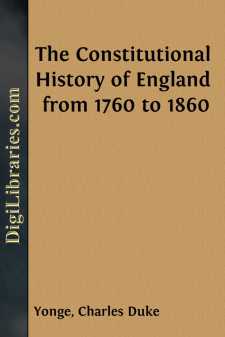Categories
- Antiques & Collectibles 13
- Architecture 36
- Art 48
- Bibles 22
- Biography & Autobiography 813
- Body, Mind & Spirit 142
- Business & Economics 28
- Children's Books 15
- Children's Fiction 12
- Computers 4
- Cooking 94
- Crafts & Hobbies 4
- Drama 346
- Education 46
- Family & Relationships 57
- Fiction 11828
- Games 19
- Gardening 17
- Health & Fitness 34
- History 1377
- House & Home 1
- Humor 147
- Juvenile Fiction 1873
- Juvenile Nonfiction 202
- Language Arts & Disciplines 88
- Law 16
- Literary Collections 686
- Literary Criticism 179
- Mathematics 13
- Medical 41
- Music 40
- Nature 179
- Non-Classifiable 1768
- Performing Arts 7
- Periodicals 1453
- Philosophy 64
- Photography 2
- Poetry 896
- Political Science 203
- Psychology 42
- Reference 154
- Religion 513
- Science 126
- Self-Help 84
- Social Science 81
- Sports & Recreation 34
- Study Aids 3
- Technology & Engineering 59
- Transportation 23
- Travel 463
- True Crime 29
The Constitutional History of England from 1760 to 1860
Description:
Excerpt
CHAPTER I.
Mr. Hallam's View of the Development of the Constitution.—Symptoms of approaching Constitutional Changes.—State of the Kingdom at the Accession of George III.—Improvement of the Law affecting the Commissions of the Judges.—Restoration of Peace.—Lord Bute becomes Minister.—The Case of Wilkes.—Mr. Luttrell is Seated for Middlesex by the House of Commons.—Growth of Parliamentary Reporting.—Mr. Grenville's Act for trying Election Petitions.—Disfranchisement of Corrupt Voters at New Shoreham.
The learned and judicious writer to whom is due the first idea of a "Constitutional History of England," and of whose admirable work I here venture to offer a continuation, regards "the spirit of the government" as having been "almost wholly monarchical till the Revolution of 1688," and in the four subsequent reigns, with the last of which his volumes close, as "having turned chiefly to an aristocracy."[] And it may be considered as having generally preserved that character through the long and eventful reign of George III. But, even while he was writing, a change was already preparing, of which more than one recent occurrence had given unmistakable warning. A borough had been disfranchised for inveterate corruption in the first Parliament of George IV.[] Before its dissolution, the same House of Commons had sanctioned the principle of a state endowment of the Roman Catholic clergy in Ireland, and had given a third reading to a bill for the abolition of all civil restrictions affecting members of that religion. It was impossible to avoid foreseeing that the Parliamentary Reform inaugurated by the disfranchisement of Grampound would soon be carried farther, or that the emancipation, as it was termed, of all Christian sects was at least equally certain not to be long delayed. And it will be denied by no one that those measures, which had no very obscure or doubtful connection with each other, have gradually imparted to the constitution a far more democratic tinge than would have been willingly accepted by even the most liberal statesman of the preceding century, or than, in the days of the Tudors or of the Stuarts, would have been thought compatible with the maintenance of the monarchy.
When George III. came to the throne, he found the nation engaged in a war which was occupying its arms not only on the Continent of Europe, but in India and America also, and was extending her glory and her substantial power in both hemispheres. Inter arma silent leges. And, while the contest lasted, neither legislators in Parliament nor the people outside had much attention to spare for matters of domestic policy. Yet the first year of the new reign was not suffered to pass without the introduction of one measure limiting the royal prerogative in a matter of paramount importance to the liberty of the people, the independence of the judges. The rule of making the commissions of the judges depend on their good conduct instead of on the pleasure of the crown had, indeed, been established at the Revolution; but it was still held that these commissions expired with the life of the sovereign who had granted them; and, at the accession of Anne, as also at that of George II., a renewal of their commissions had been withheld from some members of the judicial bench....



